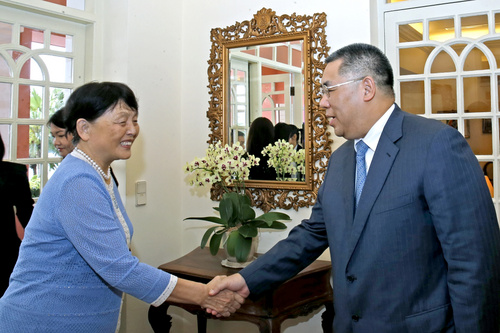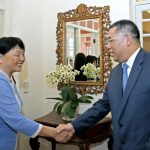 Chief Executive, Mr Chui Sai On, meets with the Vice Chairwoman of the 11th National Committee of the Chinese People’s Political Consultative Conference (CPPCC) and Honorary Chairwoman of World Cultural Forum (Taihu, China), Ms Zhang Meiying, at Santa Sancha.
Chief Executive, Mr Chui Sai On, meets with the Vice Chairwoman of the 11th National Committee of the Chinese People’s Political Consultative Conference (CPPCC) and Honorary Chairwoman of World Cultural Forum (Taihu, China), Ms Zhang Meiying, at Santa Sancha.
The Government is stepping up efforts to diversify Macao’s economy by allocating more support to the MICE (meetings, incentives, conventions and exhibitions) sector; to the cultural and creative sectors; and to the traditional Chinese medicine sector. The Chief Executive, Mr Chui Sai On, said so today in his opening remarks at the Fourth Annual Conference of World Cultural Forum (Taihu, China). The Government is making every effort to achieve the development goals of transforming Macao into a world centre of tourism and leisure and a commercial and trade cooperation service platform between China and the Portuguese-speaking countries (policies collectively known as “Centre and Platform”), Mr Chui said. The Chief Executive said the Government would put further effort – in pursuing the “Centre and Platform” policies – into making good use of Macao’s unique cultural heritage. Such effort would help create new and pleasurable leisure experiences for visitors to Macao. The Fourth Annual Conference of World Cultural Forum (Taihu, China) is this year being held in Macao, until 9 June. The three-day Forum has the theme “Join Hands for a Human Destiny Community”. The fourth edition of the Forum highlighted the city’s growing role as a platform for cultural exchanges and was a recognition of the importance of the city’s MICE sector, Mr Chui said. Macao would make further contributions in the development of the nation’s “Belt and Road” initiative. Macao would do so via its cultural exchanges with cities and countries on the routes covered by the “Belt and Road” initiative. “Belt and Road” refers to the Silk Road Economic Belt and the 21st-Century Maritime Silk Road. Only via constant exchanges between communities would the world further the process of development, and cope with the challenges of the times, said the Chief Executive. Mr Chui detailed Macao’s success in the following matters: its advantages arising from the “One country, two systems” principle; and Macao’s inclusion on the World Heritage List of the United Nations Educational, Scientific and Cultural Organization (UNESCO). On Tuesday (7 June), the Chief Executive met with the Vice Chairwoman of the 11th National Committee of the Chinese People’s Political Consultative Conference (CPPCC) and Honorary Chairwoman of World Cultural Forum (Taihu, China), Ms Zhang Meiying, to exchange views on Macao’s development prospects. During the meeting at Santa Sancha, Mr Chui said the Government was giving its full support to this edition of the Forum. Macao’s successful delivery of the event had great symbolic importance for the diversification of the city’s economy. The “One country, two systems” principle enabled Macao to received considerable support from the Central Government. This was helping to focus the patriotic spirit of Macao people and to introduce younger members of the community in particular to the latest developments on the mainland and the latest progress there, said Mr Chui. Ms Zhang noted that this was her first visit to Macao and that she had been able to experience the city’s unique culture. She added she hoped that Macao’s experience of hosting World Cultural Forum (Taihu, China) would assist the city in developing its bridging role. Macao would benefit from the further effort put into promoting the city’s sustainable development, she said, adding that public policy related to the MICE sector could help to achieve the goal of economic diversification. World Cultural Forum (Taihu, China) is an annual non-governmental event held in China. It aims to promote development of Chinese culture and cross-cultural communications between China and foreign countries.


